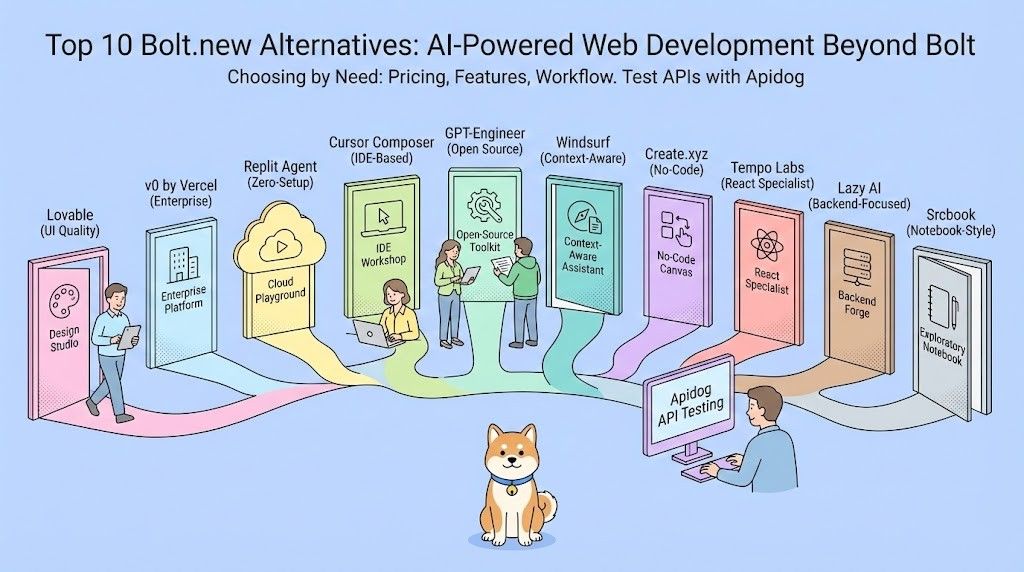Automated testing tools are essential for keeping software quality high, speeding up development, and reducing errors. With so many options out there, finding the right tools can make a big difference.

This guide explores 21 top open-source and free automated testing tools. We’ve selected a variety of tools to match different testing needs, from API and web testing to mobile apps and performance checks.
For each tool, you’ll find a clear breakdown of features, technical specs, and real-world applications. Whether you’re a QA expert, a developer, or a project manager, this guide will help you pick the best tools for your projects.
Now, let's dive into the list:
1. Apidog: The Ultimate Tool for API Automated Testing

Ready to supercharge your API testing workflow? Apidog delivers the perfect blend of power and ease, offering all the tools you need to automate and optimize API testing like never before. With Apidog, both beginners and seasoned developers can create, manage, and collaborate on API tests with a few clicks—saving time and reducing the complexity of testing processes.
Here’s why Apidog stands out:
- Effortless Test Creation: Apidog’s intuitive UI makes creating and managing tests straightforward, even for users without extensive technical expertise.
- Versatile Protocol Support: Whether you’re working with REST, GraphQL, or SOAP, Apidog has you covered, ensuring compatibility across various API architectures.
- Automatic Test Generation: Generate tests directly from API specifications, accelerating your testing process and reducing manual work.
- Real-Time Collaboration: Enable seamless team collaboration with features that let multiple users create, edit, and share test cases together.
- Detailed Reporting and Analytics: Track testing progress and outcomes with comprehensive reporting, giving you full visibility into the quality of your APIs.
- Flexible Language Support: Write and script tests in JavaScript, Python, or Java—Apidog adapts to your team’s needs.
- CI/CD Integration: Easily integrate with CI/CD pipelines and version control systems like Git, making it perfect for streamlined DevOps workflows.
- Test Data Management: Generate, import, and export test data effortlessly, simplifying test scenario management for large projects.
- Enhanced Productivity: Simplifies API testing from start to finish, drastically reducing the time and effort required.
- Comprehensive API Lifecycle Management: Manage every step of API testing—from creation to deployment—with a tool that covers it all.
Pricing: Apidog offers a free plan to get you started, with premium plans from just $9/month for access to advanced features.
Summary: Apidog is the ultimate choice for teams looking to streamline API testing and ensure robust API quality. With its user-friendly design, advanced automation, and powerful collaboration features, Apidog is your key to faster, easier, and more efficient API testing. Start testing smarter with Apidog today!
2. PFLB: The Ultimate Load Testing Tool

PFLB is a leading company specializing in performance and load testing services. They offer a cloud-based continuous performance testing platform that is designed to address a wide range of testing needs. Key features of the platform include a low-code editor, seamless CI/CD integration, JMeter support, and comprehensive reporting capabilities through Grafana. PFLB supports geo-distributed load testing from multiple locations, ensuring realistic and robust testing scenarios that can mimic real-world usage. Additionally, the platform offers automated performance test plans, reducing manual effort and increasing testing efficiency.
Pros:
- The PFLB Platform is simple to use and navigate, ensuring a great user experience.
- The platform is scalable, allowing for expansion and increased demand as needed.
- PFLB offers automation features that reduce manual testing efforts and increase efficiency.
- Supports the creation of realistic testing scenarios that mimic real-world usage, providing more accurate performance metrics.
Cons:
- PFLB Platform currently only supports HTTP(-s)-based protocols.
Summary: PFLB's platform stands out as a robust and efficient solution for performance and load testing. While the limitation to HTTP(-s)-based protocols may present challenges for certain use cases, the platform's strengths in automation, scalability, and real-world testing capabilities make it an excellent choice for many organizations. PFLB continues to innovate, and as it expands its protocol support, it will likely become an even more versatile player in the performance testing industry.
3. Selenium: The Veteran Web Automated Testing Tool
Selenium is a time-tested favorite in the web automation space, known for its flexibility and extensive support for multiple programming languages. It has established itself as a reliable tool for web testing, capable of handling everything from simple scripts to complex test scenarios.
Key Features:
- Language Support: Works with a wide range of programming languages, including Java, Python, C#, and more, offering versatility for different projects.
- Cross-Browser Testing: Allows tests to be run across different browsers, ensuring compatibility and reliability.
- Extensive Community Support: A large user base provides a wealth of resources, tutorials, and plugins to enhance Selenium's functionality.
- CI/CD Integration: Easily integrates with continuous integration and delivery pipelines, facilitating automated testing in development workflows.
Technical Details:
- WebDriver API: Provides precise browser control, allowing detailed interactions within the browser environment.
- Selenium Grid: Enables parallel test execution across multiple machines, reducing testing time.
- Headless Browser Testing: Supports testing in a headless mode, where the browser runs in the background without a GUI, speeding up test execution.
Pros:
- Highly Flexible: Offers a high degree of customization, allowing testers to tailor their scripts to specific needs.
- Large Community: Extensive documentation and community support make troubleshooting easier and provide continuous learning opportunities.
- Open Source: Completely free to use, making it accessible for projects of all sizes.
Cons:
- Steep Learning Curve: Requires a solid understanding of programming, which might be challenging for beginners.
- Slower Execution: Test execution can be slower compared to more modern tools, particularly when running complex scripts.
Pricing: Free and open-source.
Summary: Selenium is ideal for teams with strong programming skills looking for a versatile web testing solution that can be deeply customized. Its robust feature set and community support make it a reliable choice for both small projects and large enterprise applications.
4. Appium: The Mobile App Automated Testing Tool
Appium is a leading tool in the mobile app testing space, enabling developers to write tests for both Android and iOS platforms using a single API. Its cross-platform capabilities and reliance on standard automation APIs make it a popular choice for mobile app testing.
Key Features:
- Cross-Platform Support: Allows testing across iOS, Android, and even Windows platforms, providing a unified approach to mobile testing.
- Standard Automation APIs: Uses standard automation frameworks, meaning you don’t need to modify your app to create tests.
- Multi-Language Support: Compatible with various programming languages, including Java, Python, and JavaScript.
- No App Modification Required: Tests can be written without altering the source code of the application, preserving the app's integrity.
Technical Details:
- Selenium WebDriver Protocol: Leverages the Selenium WebDriver protocol for consistency in testing across different platforms.
- Support for Different App Types: Capable of testing native, hybrid, and mobile web apps, offering flexibility in test scenarios.
- Framework Integration: Integrates with popular testing frameworks like TestNG and JUnit, streamlining the testing process.
Pros:
- Unified API: A single API covers multiple platforms, simplifying test creation and maintenance.
- No Source Code Required: Allows testing without access to the app’s source code, making it suitable for testing third-party apps.
- Versatile Language Support: Works with a variety of programming languages, enhancing its appeal to a broad audience.
Cons:
- Complex Setup: Initial setup can be challenging, particularly for those new to mobile testing.
- Slower Test Execution: Execution speed can be slower compared to tools designed for a specific platform.
Pricing: Free and open-source.
Summary: Appium is perfect for teams developing mobile applications and wanting to ensure consistent quality across platforms without maintaining separate test suites. Its cross-platform capabilities and extensive language support make it a versatile tool for mobile app testing.
5. JUnit: The Java Unit Automated Testing Tool
JUnit is a staple in the Java development world, providing a simple yet powerful framework for unit testing. Its effectiveness and ease of integration make it a go-to tool for Java developers focused on test-driven development (TDD).
Key Features:
- Simple Annotations: Uses straightforward annotations to create tests, making the process quick and intuitive.
- Assertions: Provides a range of assertions to validate test results, ensuring code behaves as expected.
- Test Runners: Includes built-in test runners that execute tests and report results.
- IDE Integration: Integrates seamlessly with major IDEs like IntelliJ IDEA, Eclipse, and NetBeans, streamlining the development process.
Technical Details:
- Java 8 Support: Fully supports Java 8 and above, making it compatible with modern Java applications.
- Extensibility: Can be extended with custom runners and rules, offering flexibility for more complex test scenarios.
- Parameterized Tests: Supports parameterized tests, which are essential for data-driven testing.
Pros:
- Easy to Use: Simple syntax and powerful features make it easy to implement and run tests.
- Well-Documented: Extensive documentation and community support provide ample resources for learning and troubleshooting.
- Regular Updates: Continuously updated to align with the latest Java versions and best practices.
Cons:
- Java-Only: Limited to the Java ecosystem, making it less useful for projects using other languages.
- Basic Reporting: Out-of-the-box reporting capabilities are limited, requiring additional tools for more detailed reports.
Pricing: Free and open-source.
Summary: JUnit is essential for Java developers looking to implement robust unit testing in their projects. Its simplicity, combined with powerful features, provides a solid foundation for test-driven development, helping teams maintain high code quality.
6. Cypress: The Modern Web Automated Testing Tool
Cypress has quickly become a favorite among front-end developers for its unique approach to web testing. Running directly in the browser, Cypress offers fast, reliable, and developer-friendly testing, making it a modern alternative to traditional tools like Selenium.
Key Features:
- Real-Time Reloading: Automatically reloads tests as code changes, providing immediate feedback.
- Automatic Waiting: Automatically waits for elements to become visible or actionable, reducing flaky tests.
- Debuggability: Provides powerful debugging tools, including time travel and detailed error messages.
- Consistent Results: Ensures tests run consistently across different environments, reducing test flakiness.
Technical Details:
- Node.js-Based: Built on Node.js, making it a natural fit for JavaScript-based projects.
- Mocha Framework: Uses the Mocha testing framework, with Chai for assertions, providing a familiar setup for JavaScript developers.
- JavaScript and TypeScript Support: Fully supports both JavaScript and TypeScript, catering to modern front-end development needs.
Pros:
- Fast Execution: Runs tests quickly, providing near-instant feedback to developers.
- Excellent Debugging: Advanced debugging capabilities make it easier to identify and fix issues.
- Automatic Waiting: Reduces the chances of flaky tests, improving the reliability of the testing process.
Cons:
- Web-Only: Limited to testing web applications, with no native support for mobile or desktop apps.
- Higher Cost for Enterprise Features: While the core is open-source, advanced features come with a higher price tag.
Pricing: Open-source core with paid plans for additional features starting at $75/month.
Summary: Cypress is excellent for front-end developers who want a modern, fast, and reliable testing tool for web applications especially those built with JavaScript frameworks.
7. Robot Framework: The Keyword-Driven Automated Testing Tool
Robot Framework is a versatile and powerful test automation tool that emphasizes readability and ease of use. With its keyword-driven approach, it allows both technical and non-technical team members to contribute to the testing process.
Key Features:
- Keyword-Driven Testing: Enables the creation of test cases using human-readable keywords, making it accessible to a broad audience.
- Extensible with Libraries: Can be extended with Python and Java libraries, providing a wide range of functionalities for different types of testing.
- Built-in Reporting: Automatically generates detailed and comprehensive test reports.
- Support for Various Test Types: Handles web, mobile, and API testing with ease, making it a versatile tool.
Technical Details:
- Core: Built on Python, offering flexibility and ease of integration with other Python-based tools.
- External Libraries: Supports the integration of numerous external libraries for added functionality.
- Selenium Integration: Works seamlessly with Selenium for web testing, providing robust web automation capabilities.
Pros:
- Readable Test Cases: The keyword-driven approach ensures that test cases are easy to read and understand, even for non-technical stakeholders.
- Highly Extensible: The ability to add custom libraries makes Robot Framework adaptable to a wide range of testing needs.
- Comprehensive Reporting: Built-in reporting tools provide detailed insights into test results.
Cons:
- Learning Curve: The keyword-driven methodology may require some time to master, especially for those unfamiliar with the concept.
- Performance: Test execution can be slower compared to more code-centric frameworks, especially for large test suites.
Pricing: Robot Framework is completely free to use, making it an attractive option for teams on a budget.
Summary: Robot Framework is ideal for teams looking for a tool that balances readability with power, allowing for collaboration between technical and non-technical team members. Its extensibility and wide range of supported testing types make it a robust choice for diverse testing needs.
8. Postman: The API Development and Automated Testing Tool
Postman has evolved from a simple API development tool into a comprehensive platform for API testing, documentation, and collaboration. It’s a go-to tool for developers and testers alike when it comes to managing APIs.
Key Features:
- Intuitive GUI: The user-friendly interface makes API testing accessible, even for those without extensive technical backgrounds.
- Collection Runner: Allows you to run automated tests across collections of API requests, streamlining the testing process.
- Newman CLI: Integrates with CI/CD pipelines, enabling automated testing as part of your continuous integration process.
- Extensive Documentation: Rich documentation and tutorials make it easy to get started and maximize the tool’s potential.
Technical Details:
- Authentication Support: Handles various authentication methods, including OAuth, JWT, and API keys, ensuring secure testing.
- Test Scripting: Supports test scripting in JavaScript, allowing for flexible and customizable test scenarios.
- Environment Management: Facilitates the management of different environments and variables, ensuring tests are adaptable and scalable.
Pros:
- User-Friendly: The intuitive interface and extensive resources make it easy for teams to adopt and start using Postman quickly.
- Comprehensive API Testing: Postman’s capabilities extend beyond simple requests, offering robust testing features.
- Strong Community Support: A large and active user community provides support, plugins, and integrations.
Cons:
- Limited Reporting in Free Version: Advanced reporting features are only available in the paid plans, which might be a limitation for some users.
- Resource-Intensive: Handling large test suites can be resource-heavy, potentially impacting performance.
Pricing: The free plan is sufficient for basic API testing, while paid plans start at $14/user/month for additional features.
Summary: Postman is perfect for API developers and testers who want a tool that integrates seamlessly into their workflow, offering powerful features without sacrificing ease of use.
9. TestNG: The Next Generation Java Automated Testing Tool
TestNG is a popular testing framework that offers more advanced features and greater flexibility compared to JUnit, making it well-suited for complex test scenarios in Java applications.
Key Features:
- Advanced Annotations: Provides a rich set of annotations for more powerful test configurations, enabling sophisticated test setups.
- Parallel Test Execution: Supports parallel execution of tests, significantly reducing the time required for large test suites.
- Flexible Test Grouping: Allows you to group tests in various ways, making it easier to manage and run specific subsets of tests.
- Data-Driven Testing: Supports data-driven testing, allowing tests to be executed with different sets of data.
Technical Details:
- Java 7 and Above: Compatible with modern Java versions, ensuring support for contemporary Java development practices.
- Reporting Tool Integration: Can be integrated with various reporting tools for enhanced test result analysis.
- Dependency Testing: Built-in support for dependency testing, allowing you to define test dependencies and control execution order.
Pros:
- Flexible and Powerful: Offers more flexibility than JUnit, making it ideal for complex and large-scale testing scenarios.
- Parallel Execution: The ability to run tests in parallel makes it efficient for large projects.
- Advanced Features: Supports sophisticated test scenarios, such as dependency testing and data-driven testing.
Cons:
- Steeper Learning Curve: The advanced features can be challenging to learn for those new to the framework.
- Limited to Java: TestNG is specific to the Java ecosystem, which may limit its applicability for teams working with multiple programming languages.
Pricing: TestNG is free to use, making it a cost-effective option for Java teams.
Summary: TestNG is an excellent choice for Java developers who need a robust and flexible testing framework that can handle complex and large-scale testing requirements, particularly in enterprise environments.
10. Katalon Studio: The All-in-One Automated Testing Tool
Katalon Studio is a comprehensive testing solution that offers capabilities for web, API, mobile, and desktop testing within a single platform. It balances ease of use with powerful features, catering to teams with varying levels of automation experience.
Key Features:
- Record and Playback: Simplifies test creation with record and playback functionality, allowing quick test generation without coding.
- Built-In Keywords: Offers a wide range of built-in keywords for creating tests, enabling even non-programmers to develop automated tests.
- Integration: Integrates with popular tools such as Jira, Git, and Slack, facilitating collaboration and CI/CD pipeline integration.
- Cross-Browser and Cross-Platform Testing: Supports testing across multiple browsers and platforms, ensuring consistent application behavior.
Technical Details:
- Based on Selenium and Appium: Leverages the power of Selenium and Appium for web and mobile testing, providing a robust testing foundation.
- Scripting Languages: Supports Groovy and Java for more advanced test scripting needs.
- Object Repository: Includes a built-in object repository for easy management of UI elements.
Pros:
- Beginner-Friendly: The record and playback feature, along with built-in keywords, makes it accessible to testers with limited programming skills.
- Comprehensive Solution: Offers a unified platform for different types of testing, reducing the need for multiple tools.
- Balanced Approach: Combines codeless and code-based testing, catering to both novice and experienced testers.
Cons:
- Limited Customization: While powerful, it may not offer the same level of customization as pure code-based frameworks.
- Performance: Can be slow for very large test suites, particularly those with complex scenarios.
Pricing: The free version is robust enough for most testing needs, with paid plans starting at $118/month for additional features.
Summary: Katalon Studio is ideal for teams looking for an all-in-one testing tool that supports a wide range of testing needs, offering an excellent balance between ease of use and advanced features.
11. Watir: The Ruby Web Automated Testing Tool
Watir (Web Application Testing in Ruby) is a lightweight and elegant testing tool designed specifically for web automation using Ruby. It’s known for its simplicity and the expressive nature of Ruby, making it a favorite among Ruby developers.
Key Features:
- Clean Ruby Syntax: Offers a clean and readable syntax that aligns well with Ruby’s philosophy, making test scripts easy to write and maintain.
- Cross-Browser Support: Automates web applications across various browsers, ensuring broad compatibility.
- Integration with Ruby Tools: Works seamlessly with other Ruby tools and frameworks, such as RSpec and Cucumber, for behavior-driven development (BDD).
- Data-Driven Testing: Supports data-driven testing, allowing for extensive test coverage with different data inputs.
Technical Details:
- Selenium WebDriver-Based: Built on top of Selenium WebDriver, providing robust and reliable browser automation capabilities.
- Page Object Model: Encourages the use of the Page Object Model, a design pattern that enhances test maintainability.
- BDD Support: Integrates with BDD frameworks like RSpec and Cucumber, promoting collaboration between developers and stakeholders.
Pros:
- Expressive and Elegant: Ruby’s syntax makes test scripts easy to write and understand, particularly for Ruby developers.
- Good Integration: Works well with the Ruby ecosystem, making it a natural choice for teams already using Ruby.
- Active Community: Supported by an active community, providing plenty of resources and plugins.
Cons:
- Limited to Web Testing: Watir is focused solely on web application testing, which may limit its usefulness for projects requiring multi-platform support.
- Ruby Dependency: As a Ruby-specific tool, it's most suitable for teams already using Ruby, which might be a limitation for those working in other languages.
Pricing:
- Free and Open-Source: Watir is free to use, making it an attractive option for budget-conscious teams.
Summary: Watir is an excellent choice for teams working within the Ruby ecosystem, offering an elegant and straightforward solution for web application testing.
12. Mocha: The Flexible JavaScript Automated Testing Tool
Mocha is a feature-rich JavaScript test framework running on Node.js, making asynchronous testing simple and fun. Mocha tests run serially, allowing for flexible and accurate reporting while mapping uncaught exceptions to the correct test cases.
Key Features:
- Asynchronous Testing Support: Easily test asynchronous code.
- Test Coverage Reporting: Use with any test coverage tool.
- Use of Any Assertion Library: Compatible with any assertion library.
- Flexible and Extensible: Plugins available to extend functionality.
Pricing:Mocha is free to use and open-source.
Summary: Mocha is ideal for JavaScript developers looking for a flexible and powerful testing framework that supports asynchronous testing and integrates seamlessly with other tools.
13. Jest: The All-in-One JavaScript Automated Testing Tool
Jest is a delightful JavaScript testing framework with a focus on simplicity. It works out of the box for most JavaScript projects and is known for its ease of use and robust feature set.
Key Features:
- Zero Config for Most Projects: Minimal setup required.
- Built-in Code Coverage Reports: Automatically generates code coverage reports.
- Powerful Mocking Library: Easy to mock objects and functions.
- Parallel Test Execution: Runs tests in parallel for faster execution.
Pricing: Jest is free to use and open-source.
Summary: Jest is perfect for JavaScript developers looking for an easy-to-use, comprehensive testing framework that requires minimal configuration and includes powerful features out of the box.
14. PyTest: The Python Automated Testing Tool
PyTest is a mature full-featured Python testing tool that helps you write better programs. It is known for its simplicity, scalability, and powerful features.
Key Features:
- Simple and Readable Syntax: Easy to write and understand tests.
- Powerful Fixture Model: Manage test dependencies efficiently.
- Extensive Plugin Architecture: Many plugins available for extended functionality.
- Detailed Failure Reports: Provides detailed information on test failures.
Pricing:
- Free and Open-Source: PyTest is free to use and open-source.
Summary: PyTest is suitable for Python developers seeking a simple yet powerful testing framework with a rich set of features and a vibrant plugin ecosystem.
15. Gatling: The Load Testing Automated Tool
Gatling is a powerful open-source load testing solution designed for ease of use, maintainability, and high performance. It is particularly well-suited for web applications.
Key Features:
- High Performance: Capable of handling large numbers of users.
- Ready-to-Present HTML Reports: Automatically generates detailed reports.
- Scenario Recorder and Developer-Friendly DSL: Easy to write and record test scenarios.
- CI/CD Integration: Seamlessly integrates with CI/CD pipelines.
Pricing:
- Open-Source Core with Paid Enterprise Options: The core version is free, with paid enterprise options available.
Summary: Gatling is ideal for developers and testers who need a high-performance, open-source load testing tool with powerful features and an easy-to-use interface.
16. SoapUI: The API Automated Testing Tool
SoapUI is the world's most widely-used testing tool for SOAP and REST APIs. It allows testers to create, manage, and execute automated functional, regression, and load tests.
Key Features:
- Support for Multiple Protocols and Standards: Comprehensive API testing capabilities.
- Powerful Data-Driven Testing: Test with various data inputs.
- Extensive Reporting Capabilities: Generate detailed test reports.
- Scriptless Test Creation: Create tests without writing code.
Pricing:
- Free Open-Source Version, with Paid Pro Version Starting at $659/Year: The open-source version is free, with a paid pro version offering additional features.
Summary: SoapUI is perfect for testers who need a comprehensive, powerful tool for testing SOAP and REST APIs.
17. Cucumber: The Behavior-Driven Development Automated Testing Tool
Cucumber is a testing tool that supports Behavior-Driven Development (BDD), allowing teams to describe how software should behave in plain text.
Key Features:
- Human-Readable Test Scenarios: Write tests in plain language.
- Support for Multiple Programming Languages: Compatible with various languages.
- Integration with Other Testing Tools: Works well with other tools and frameworks.
- Promotes Collaboration: Facilitates communication between technical and non-technical team members.
Pricing:
- Free and Open-Source: Cucumber is free to use and open-source.
Summary: Cucumber is ideal for teams practicing BDD, enhancing collaboration and ensuring that all stakeholders can understand test cases.
18. Apache JMeter: The Performance Testing Automated Tool
Apache JMeter is an open-source software designed to load test functional behavior and measure performance. It is primarily used for web applications but has capabilities to handle other protocols.
Key Features:
- Support for Various Protocols: HTTP, JDBC, LDAP, and more.
- Highly Extensible through Plugins: Enhance functionality with plugins.
- Powerful Test Data Analysis and Visualization: Analyze and visualize test data effectively.
- Simulate Heavy Loads on Servers: Test the performance of servers under stress.
Pricing:
- Free and Open-Source: JMeter is free to use and open-source.
Summary: JMeter is suitable for testers who need a robust, extensible tool for performance testing across various protocols.
19. Puppeteer: The Headless Chrome Automated Testing Tool
Puppeteer is a Node.js library that provides a high-level API to control Chrome or Chromium over the DevTools Protocol. It is widely used for automating web page interactions and testing.
Key Features:
- Generate Screenshots and PDFs of Pages: Easily create visual outputs.
- Automate Form Submission, UI Testing, Keyboard Input: Comprehensive automation capabilities.
- Create an Up-to-Date, Automated Testing Environment: Ensure consistent testing environments.
- Crawl a SPA and Generate Pre-Rendered Content: Useful for SEO purposes.
Pricing:
- Free and Open-Source: Puppeteer is free to use and open-source.
Summary: Puppeteer is perfect for developers who need to automate web page interactions and testing using a headless browser.
20. WebdriverIO: The Next-Gen WebDriver Test Automation Framework
WebdriverIO is a popular test automation framework that allows you to run tests based on the WebDriver protocol and the Chrome DevTools protocol.
Key Features:
- Easy Setup and Configuration: Get started quickly with minimal setup.
- Support for Various Testing Types: Unit, end-to-end, and mobile testing.
- Integration with Popular Tools and Services: Works well with other tools.
- Extensive Plugin System: Enhance functionality with plugins.
Pricing:
- Free and Open-Source: WebdriverIO is free to use and open-source.
Summary: WebdriverIO is suitable for developers and testers who need a versatile, easy-to-configure test automation framework.
21. Nightwatch.js: The End-to-End Testing Automated Framework
Nightwatch.js is an integrated, easy-to-use end-to-end testing solution for web applications and websites, written in Node.js.
Key Features:
- Built-In Test Runner and Assertion Library: Simplifies writing and running tests.
- Page Object Model Support: Enhances test maintainability.
- CSS/XPath Selectors: Supports various selectors for locating elements.
- Continuous Integration Support: Integrates seamlessly with CI tools.
Pricing:
- Free and Open-Source: Nightwatch.js is free to use and open-source.
Summary: Nightwatch.js is perfect for teams needing a straightforward, integrated solution for end-to-end testing of web applications.
Conclusion: Choosing the Right Automated Testing Tool
Remember, the best tool is the one that fits your specific needs and helps your team deliver high-quality software efficiently. Don't be afraid to experiment with different tools to find the perfect fit for your project.
By leveraging these powerful automated testing tools, you can significantly improve your software quality, reduce time-to-market, and build more reliable applications. Each tool has its strengths and is suited for different scenarios, so consider your project's specific requirements when making a choice.
As the field of software testing continues to evolve, staying updated with the latest tools and best practices is crucial. Regularly reassess your testing strategy and be open to adopting new tools that can enhance your testing processes.




